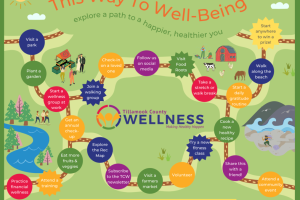Your Path to Wellness

Defining Wellness
Wellness is a multifaceted concept that goes beyond the absence of illness. It encompasses various dimensions of health, including physical, mental, emotional, social, and spiritual well-being. Rather than viewing wellness as a single state of being, it is more productive to see it as a continuous journey towards a balanced and fulfilling life. For instance, consider Sarah, a busy professional and mother of two. She initially thought that achieving wellness meant simply hitting the gym occasionally and eating salads. However, she soon realized that wellness also included managing stress, nurturing her relationships, and finding time for introspection. Thus, wellness is holistic; it involves the integration of these different aspects to foster a well-rounded life.
- Your Path to Wellness
- Defining Wellness
- Importance of Prioritizing Wellness
- Physical Wellness
- Benefits of Regular Exercise
- Maintaining a Healthy Diet
- Mental Wellness
- Strategies for Stress Management
- Importance of Mental Health Support
- Emotional Wellness
- Developing Healthy Coping Mechanisms
- Building Resilience
- Social Wellness
- Nurturing Supportive Relationships
- Setting Boundaries in Social Interactions
- Spiritual Wellness
- Exploring Spiritual Practices
- Finding Meaning and Purpose in Life
Importance of Prioritizing Wellness
In today’s fast-paced world, prioritizing wellness is not merely a luxury; it is a necessity. Individuals who invest time in their wellness often experience a range of benefits, both personally and professionally. Some of these include:
- Increased Productivity: Improved physical health and mental clarity lead to better focus at work.
- Enhanced Relationships: Individuals who practice wellness are more likely to prioritize positive interactions and healthy relationships.
- Improved Resilience: A commitment to wellness equips individuals with the tools to handle life’s challenges with grace and ease.
It is essential to recognize that wellness is not a one-size-fits-all approach. Each person’s journey is unique, shaped by their circumstances and personal choices. By making wellness a priority, individuals can create a more vibrant and satisfying life. Therefore, embarking on this journey is not just beneficial; it can be life-changing.
Physical Wellness
Benefits of Regular Exercise
Continuing the journey towards holistic wellness, physical wellness plays a crucial role in shaping overall health and well-being. One of the cornerstone activities for achieving physical wellness is regular exercise. Take John, for example. After incorporating a consistent workout routine into his life—mixing cardio, strength training, and flexibility exercises—he witnessed remarkable changes. His energy levels soared, and he even found himself managing stress more effectively. The benefits of regular exercise include:
- Boosted Mood: Physical activity triggers the release of endorphins, often referred to as “feel-good” hormones, contributing to reduced anxiety and depression.
- Enhanced Strength and Endurance: Over time, regular exercise builds muscle strength, stamina, and overall physical performance.
- Better Sleep: Staying active can help regulate sleep patterns, enabling deeper and more restorative sleep.
- Weight Management: Combining exercise with a balanced diet helps maintain a healthy body weight and reduces the risk of chronic diseases.
Maintaining a Healthy Diet
Alongside exercise, maintaining a healthy diet is vital for physical wellness. This involves consuming a variety of nutrients that support bodily functions while also enhancing energy levels. Consider Maya, who transformed her eating habits by incorporating more whole foods like fruits, vegetables, whole grains, and lean proteins. Not only did she feel more energetic, but she also saw improvements in her digestion and skin. To maintain a healthy diet, consider these tips:
- Stay Hydrated: Drinking plenty of water is essential for overall health.
- Balanced Meals: Aim for plates filled with a colorful array of foods, which ensures a diverse nutrient intake.
- Mindful Eating: Paying attention to hunger cues and savoring each bite can prevent overeating.
By combining regular exercise with a healthy diet, individuals can significantly enhance their physical wellness, paving the way for a more fulfilling and vibrant life.
Mental Wellness
Strategies for Stress Management
Having laid the groundwork for physical wellness, it’s crucial to turn attention to mental wellness, which significantly impacts overall quality of life. One of the most pressing aspects of mental wellness is effective stress management. Consider Rachel, a college student balancing classes, a part-time job, and a social life. She found herself overwhelmed, often feeling anxious about deadlines. After exploring various stress management techniques, she discovered what worked best for her. A few strategies she embraced included:
- Mindfulness Meditation: By dedicating just ten minutes a day to meditation, Rachel learned to focus her thoughts and reduce anxiety.
- Physical Activity: Incorporating regular exercise not only improved her mood but also offered a productive outlet for her stress.
- Time Management: Using planners and to-do lists helped her prioritize tasks, breaking them down into manageable chunks, thus reducing overwhelm.
Importance of Mental Health Support
While individual strategies are valuable, it’s equally important to acknowledge the role of mental health support. Seeking help is a sign of strength, not weakness. Take Mark’s story as an example. After experiencing prolonged feelings of sadness, he decided to talk to a therapist. This decision opened the door to understanding his feelings, leading to healthier coping mechanisms. The importance of mental health support can be highlighted through these points:
- Professional Guidance: Mental health professionals can offer proven strategies tailored to individual needs.
- Community Support: Joining support groups provides a sense of belonging and shared experiences that can be comforting.
- Reducing Stigma: Open conversations about mental health help normalize seeking help, encouraging others to do the same.
Incorporating stress management techniques alongside mental health support fosters resilience and overall well-being, enhancing the journey towards holistic wellness.
Emotional Wellness
Developing Healthy Coping Mechanisms
Building upon the foundation of mental wellness, emotional wellness entails handling feelings and experiences in a constructive way. One key aspect of this is developing healthy coping mechanisms. Take the case of Lisa, a young professional who often found herself feeling overwhelmed during busy seasons at work. Instead of resorting to stress eating or isolating herself, she decided to explore healthier options for coping with her emotions. Some strategies she implemented included:
- Journaling: Writing about her feelings allowed Lisa to process emotions and gain perspective on her stressors.
- Engaging in Hobbies: Whether it was painting or gardening, dedicating time to activities she loved provided a mental escape.
- Reaching Out: Instead of bottling up emotions, she learned to express her feelings with friends, which helped her feel supported and understood.
Building Resilience
As individuals develop effective coping mechanisms, they naturally begin to build emotional resilience—the ability to bounce back from setbacks. Resilience doesn’t mean avoiding stress but rather navigating it with strength and adaptability. Consider Andrew, who faced significant challenges when he lost his job. Instead of succumbing to despair, he used this as an opportunity to pivot his career. Through attending workshops and seeking mentorship, he not only found a new job but also gained skills that made him more competitive in the workforce. Key aspects of building resilience include:
- Positive Self-Talk: Encouraging oneself with affirmations creates a proactive mindset, especially during tough times.
- Flexibility: Adapting to change and accepting that setbacks are part of life helps individuals view challenges as opportunities for growth.
By nurturing healthy coping mechanisms and fostering resilience, one can significantly enhance their emotional wellness, empowering them to face life’s inevitable ups and downs with confidence and grace.
Social Wellness
Nurturing Supportive Relationships
With a strong foundation in emotional wellness, it’s important to turn our attention to social wellness, which significantly contributes to overall life satisfaction. At the heart of social wellness lies the ability to nurture supportive relationships. Take Emma, who recently moved to a new city for work. Initially, she felt isolated, but she made a conscious effort to connect with others through local clubs and community events. By opening up to new friendships, she discovered the immense benefits of having a support circle. The key components of nurturing supportive relationships include:
- Active Listening: Making an effort to really hear what others are saying fosters deeper connections.
- Quality Time: Prioritizing time with friends and family—whether it’s a weekly coffee catch-up or a game night—strengthens bonds and creates lasting memories.
- Supporting Each Other: Providing emotional and practical support to loved ones encourages mutual growth and loyalty.
Setting Boundaries in Social Interactions
While cultivating relationships is crucial, setting boundaries is equally important for maintaining social wellness. Boundaries help protect one’s emotional space and ensure healthy interactions. Consider Liam, who often found himself overwhelmed by social obligations. After realizing he was spreading himself too thin, he decided to set clearer boundaries. He learned to say no without guilt and focused on engagements that truly mattered to him. Effective boundary-setting can involve:
- Communicating Clearly: Expressing needs and limits with honesty helps others understand personal boundaries.
- Prioritizing Self-Care: Recognizing when social interactions are draining and taking time for oneself is a vital aspect of maintaining balance.
- Evaluating Relationships: Reflecting on which relationships uplift versus drain can provide clarity in choosing where to invest time and energy.
By nurturing supportive relationships and establishing healthy boundaries, individuals can foster social wellness, leading to a more fulfilling and interconnected life.
Spiritual Wellness
Exploring Spiritual Practices
As we traverse the journey of wellness, the final piece of the puzzle is spiritual wellness. This dimension encourages individuals to seek deeper connections, whether with themselves, others, or a higher power. Exploring spiritual practices can lead to profound personal insights and peace. Consider David, a busy entrepreneur who often felt disconnected from his own values and purpose. He decided to explore different spiritual practices like yoga and meditation. By dedicating time each week to these practices, he not only reduced stress but also found mental clarity and emotional balance. Some popular spiritual practices include:
- Meditation: This can involve mindfulness or guided sessions, helping individuals to center their thoughts and promote inner peace.
- Nature Connection: Spending time outdoors allows people to appreciate the beauty of the world, fostering a sense of gratitude and interconnectedness.
- Journaling: Reflecting on personal beliefs and values through writing encourages self-discovery and growth.
Finding Meaning and Purpose in Life
Exploring spiritual practices often leads individuals to contemplate their life’s meaning and purpose. It’s essential to ask oneself what truly brings joy and fulfillment. Take the story of Karen, who spent years in a career that didn’t resonate with her values. After engaging in spiritual exploration, she realized her passion for helping others and decided to transition into counseling. This newfound direction not only brought her happiness but also allowed her to contribute positively to the lives of others. To find meaning and purpose, consider:
- Reflective Questions: Delve into what makes you feel fulfilled. What activities energize you? What values do you hold dear?
- Service to Others: Volunteering can provide a sense of purpose while impacting the community positively.
- Goal Setting: Establishing personal goals based on your passions can create a roadmap towards fulfilling your purpose.
By exploring spiritual practices and discovering one’s meaning and purpose, individuals can cultivate a deeper sense of fulfillment, enhancing overall spiritual wellness and enriching their lives.





